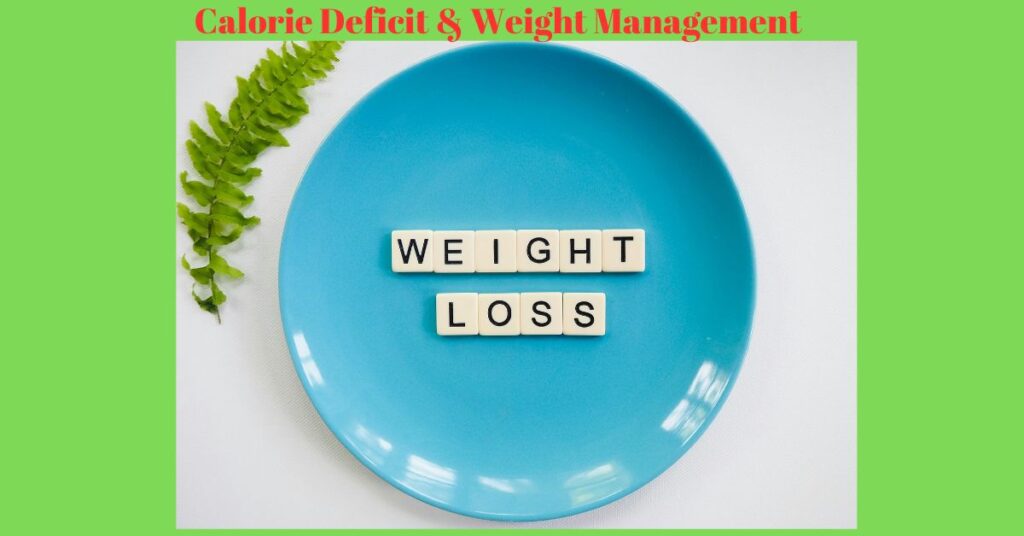A calorie deficit is when you consume fewer calories than your body burns each day. This creates an energy imbalance, forcing your body to use stored energy (fat) for daily needs. This finally leads to weight loss.
Page Contents
1.Main Benefits of a Calorie Deficit:

These are some of the chief benefits of calorie deficit:
- Weight Loss: This is the primary benefit. Weight loss accordingly leads to improved body composition and reduced risk of weight-related health issues.
- Improved Blood Sugar Control: Calorie restriction can improve insulin sensitivity and also reduce blood sugar levels. This benefits those with type 2 diabetes or pre-diabetes.
- Reduced Risk of Heart Disease: Weight loss through calorie restriction can lower blood pressure, cholesterol levels, and other risk factors for heart disease.
- Increased Energy Levels: As your body becomes more efficient at burning fat for fuel, you may experience increased energy levels and improved stamina.
- Reduced Inflammation: Calorie deficits can help reduce chronic inflammation throughout the body. This improves overall health and reducing the risk of chronic diseases.
- Improved mental health: A calorie deficit has been shown to improve mood and reduce symptoms of depression and anxiety.
2. How Calorie Deficit Leads to Weight Loss :
It is the main factor behind weight loss. It simply means consuming fewer calories than your body burns each day. When you create a calorie deficit, your body is forced to use its stored energy reserves, primarily fat. This breakdown of fat leads to weight loss.
Here’s how it works:
- Energy Balance: Your body maintains an energy balance by balancing the calories you consume (input) with the calories you burn (output). When you’re in energy balance, your weight stays stable.
- Calorie Deficit: When you eat fewer calories than your body needs, you create a calorie deficit. To compensate for this deficit, your body starts breaking down stored energy, primarily fat, for fuel.
- Fat Loss: As your body breaks down fat, it releases fatty acids into your bloodstream. These fatty acids are then transported to your cells, where they are used for energy production.
- Weight Loss: As your body continues to use stored fat for energy, you lose weight.
3.Creating a Healthy Calorie Deficit:

- Determine Your Calorie Needs: Start by calculating your daily calorie needs based on factors like age, weight, activity level, and metabolic rate. You can use Online calorie calculators or consult a registered dietician for this purpose
- Set a Realistic Deficit: Aim for a moderate calorie deficit of 500-1000 calories per day. This is generally considered safe and sustainable for long-term weight loss.
- Focus on Whole Foods: Prioritize nutrient-rich foods like fruits, vegetables, whole grains, lean protein, and healthy fats. This ensures you get the essential nutrients your body needs while staying within your calorie budget.
- Incorporate Exercise: Regular physical activity is crucial for weight loss and overall health. Aim for at least 3-4 hrs. of moderate-intensity exercise per week.
- Track Your Progress: Monitoring your calorie intake and weight regularly helps you stay on track and adjust your strategy as needed. Use a calorie tracking app or journal to track your daily food intake.
- Reduce your portion sizes: Pay attention to portion sizes and avoid overeating.
- Increase your physical activity: Engaging in regular physical activity helps you burn more calories.
- Seek Professional Guidance: Consider consulting a registered dietician or nutritionist for personalized guidance and support in creating and maintaining a healthy calorie deficit.
Remember, consistency is key to successful weight loss. Aim to create a sustainable calorie deficit that you can maintain over the long term.
4. Points to Remember while creating calorie deficit :
- A healthy calorie deficit should be gradual and sustainable, not a crash diet.
- Excessive calorie restriction can lead to muscle loss, nutrient deficiencies, hormonal imbalances, and other health problems.
- Listen to your body and adjust your calorie intake based on your individual needs and responses.
- Focus on developing healthy eating habits and sustainable lifestyle changes for long-term weight management and overall well-being.
5. Drawbacks :
While a calorie deficit is a necessary component for weight loss, it can come with some potential drawbacks. Here are some of the drawbacks of a calorie deficit:
Short-term drawbacks:
- Fatigue and lethargy: Restricting calories can lead to decreased energy levels, making it difficult to maintain your usual activity level.
- Nutrient deficiencies: If you’re not careful, you may not be consuming enough essential nutrients, such as vitamins, minerals, and fibre. This can lead to a variety of health problems, including hair loss, brittle nails, and impaired immune function.
- Digestive issues: Calorie restriction can slow down your digestion, leading to constipation, bloating, and gas.
- Muscle loss: When your body doesn’t have enough energy from food, it may start to break down muscle for energy. This can accordingly lead to a decrease in muscle mass and strength.
- Dehydration: Calorie restriction can make it difficult to stay hydrated, which can lead to headaches, fatigue, and constipation.
- Gallstones: Rapid weight loss, which can be exacerbated by a large calorie deficit, is a risk factor for developing gallstones.
- Mental health: Calorie restriction can be mentally challenging, leading to feelings of deprivation, irritability, and anxiety.
Long-term drawbacks:
- Slower metabolism: Over time, your body may adjust to a lower calorie intake by slowing down your metabolism. This can make it harder to lose weight and keep it off.
- Yo-yo dieting: Calorie restriction can lead to a cycle of weight loss and regain, which can be harmful to your health.
- Hair loss: A severe calorie deficiency can lead to hair loss.
- Menstrual irregularities: Calorie restriction can affect hormone levels, leading to menstrual irregularities or even amenorrhea (absence of periods).
- Increased risk of certain health problems: A severe calorie deficit may increase your risk of developing certain health problems, such as heart disease, osteoporosis, and malnutrition.
6. Additional Considerations :
- The severity of these negative effects will vary depending on the individual and the severity of the calorie deficit.
- It’s important to consult with a healthcare professional before starting any calorie restriction program, especially if you have any underlying health conditions.
- A moderate calorie deficit, combined with a healthy diet and regular exercise, is the safest and most effective way to lose weight and keep it off.
7.How to minimize negative effects of calorie deficit :
Here are some tips for minimizing the negative effects of a calorie deficit:
- Eat a variety of nutrient-rich foods. to ensure you’re getting all the essential nutrients your body needs.
- Take supplements if necessary, but consult with your doctor first.
- Stay hydrated by drinking plenty of water throughout the day.
- Exercise regularly, but don’t overdo it.
- Get enough sleep.
- Manage stress levels.
- Monitor your progress and adjust your calorie intake accordingly.
Therefore you should remember, it’s important to listen to your body and make adjustments to your calorie restriction as needed. If you experience any negative side effects, talk to your doctor.
8. FAQ on Calorie Deficit :

What is a calorie deficit ?
A calorie deficit is when you consume fewer calories than your body burns each day. This creates an energy imbalance, forcing your body to tap into its stored energy (fat) for fuel, leading to weight loss.
How much of a calorie deficit do I need ?
A safe and sustainable calorie deficit for healthy weight loss is generally around 500 calories per day. This converts to a weight loss of approximately 1 pound per week. However, individual needs can vary based on factors like age, activity level, and starting weight. It’s always best to consult a healthcare professional or registered dietician for personalized advice.
What are some ways to create a calorie deficit?
- Reduce calorie intake: This can involve eating smaller portions, choosing lower-calorie foods, and limiting processed foods and sugary drinks.
- Increase physical activity: Exercise burns calories, so engaging in more physical activity helps create a calorie deficit. Aim for at least 30 minutes of moderate-intensity exercise most days of the week.
- Combine both: Combining a moderate reduction in calorie intake with regular exercise is the most effective way to create a sustainable calorie deficit for weight loss.
How do I track my calorie intake and expenditure?
Several tools can help you track your calories, including:
- Calorie tracking apps: Several apps, like MyFitnessPal and Lose It! Healthyfyme allow you to log your food intake and exercise, providing you with an estimate of your calorie balance.
- Food journals: Manually recording your food intake and activity level in a journal can help you stay mindful of your calorie balance.
- Wearable fitness trackers: These devices can track your steps, heart rate, and other metrics, accordingly helping you estimate your calorie expenditure.
What are some tips for maintaining a calorie deficit?
- Set realistic goals: Aim for a gradual and sustainable weight loss. Setting unrealistic expectations can lead to frustration and make it more difficult to stick to your plan.
- Focus on healthy eating: Choose nutrient-rich foods like fruits, vegetables, whole grains, and lean protein to ensure your body gets the nutrients it needs while in a calorie deficit.
- Stay hydrated: Drinking plenty of water helps you feel full and can reduce cravings.
- Get enough sleep: Lack of sleep can disrupt hormones that regulate appetite and metabolism, making it more challenging to stay in a calorie deficit.
- Find an activity you enjoy: Exercise shouldn’t feel like a chore. Choose an activity you enjoy, making it more likely you’ll stick with it in the long term.
- Don’t be afraid to ask for help: If you’re struggling to create and maintain a calorie deficit, consult a healthcare professional or registered dietitian for personalized guidance.
Is it safe to be in a calorie deficit?
A moderate calorie deficit is generally safe for most healthy adults. However, it’s essential to ensure you’re consuming enough calories to meet your basic nutritional needs. Severely reducing calories can lead to nutrient deficiencies, fatigue, muscle loss, and other health problems. So it’s crucial to consult a healthcare professional before starting any weight loss program, especially if you have any underlying health conditions.
9. Conclusion:
So by implementing a healthy calorie deficit you can achieve your weight loss goals and unlock multiple health benefits.
Finally it’s important to note that the ideal calorie deficit for weight loss varies from person to person and depends on factors such as age, sex, activity level, and current weight.
Therefore it’s generally recommended to aim for a moderate calorie reduction of 500-1000 calories per day.
Also Read : Weight Loss Food , The ultimate guide to healthy eating.
